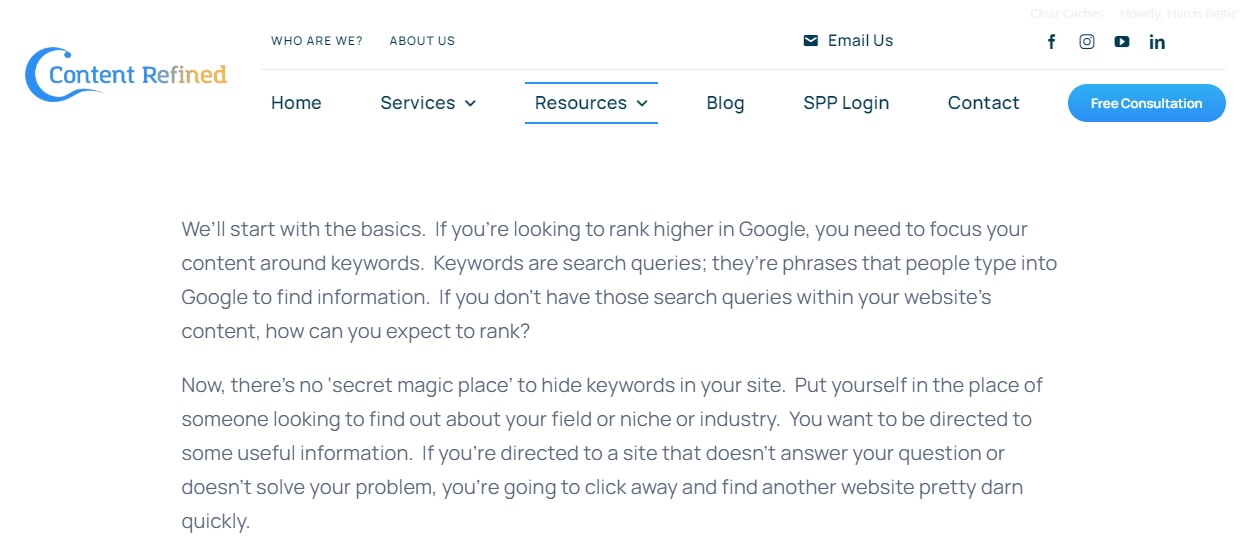Voice search is a prominent indicator of how technological advances continue to change how we use the internet. Initially, search engines used a wide variety of succinct keywords to boil down user intent and find out what people were looking for, but now things are changing. As more people use voice recognition software to search the internet, search engines like Google are altering how they display webpage results.
As voice search becomes more prevalent, search engines are thinking about changing how they display search results to users. And this is something they’ve been considering for almost ten years. Recently, the number of people using voice search to comb through the internet archives has shot up massively. As of 2023, 27% of the global population uses voice search on their mobile phones. As of 2014, over 41% of US adults and 55% of US teens use voice search daily.
The times are changing, and they’ve been changing for the last decade. We’re just really starting to see how widespread voice search is. So, let’s look more into how voice search is changing SEO.
Understanding Voice Search
Voice search is self-explanatory, but sometimes the simplest definitions are the most difficult to comprehend. To clarify things, voice search is using the voice search feature on your smartphone, smart speaker, voice-activated browser, or some other technology to look things up online using a search engine. Voice search is growing in popularity because it can feel more natural to Google something using your free-ranging thoughts rather than utilizing the right keywords.
Voice search is also growing in popularity because of its overall accessibility. These days, most people in developed countries have access to smartphones or use them regularly. As a result, voice search comes for free. Most, if not all, modern smartphones also come with some sort of digital assistant, be it Google Assistant, Siri, or Cortana. These assistants naturally incorporate voice search as an integral part of their utilization. In other words, if you want to use your digital assistant, you will need to use voice search. It’s surprisingly simple how easy it is to discover how to optimize your business for local voice search.
How Does Voice Search Work, Exactly?
The technology that powers voice search isn’t as complicated as you might think, making it so incredibly successful. An automatic speech recognition system is implemented into these devices to translate detected voice signals into text instantly. Currently, search engine queries are put into web browser search bars as is. This gives users slightly different results than they might be used to because search engines typically rank pages and their relevance based on the number of keywords they utilize in certain ways. However, people’s natural language needs to be processed a little differently to give relevant search results. People are more likely to use short, succinct phrases to search for queries when typing. However, when speaking, people talk in long-form sentences that machines might have more difficulty interpreting.

With machine learning advancements, voice assistants can better take in natural language queries and process them more accurately. This is very important if search engines want to increase their accuracy when displaying search results. As is, there is a growing amount of discontent among users of most search engines. This could be partly due to the fact that more and more people are using voice search functions – Google search engine algorithms haven’t yet caught up with how users are making queries online.
Popular Voice Assistants and Devices

While there are clear differences in the access that people have to search engines, they all work in very similar ways. Most of them, especially Amazon Alexa, Siri, and Google Assistant, are equipped with machine-learning capabilities that allow them to learn from unique users. In other words, the more you utilize your voice assistant, the more it will be able to deliver you the results that you want. Data sets that these assistants use are varied and include user buying and browsing histories, niche interests, social media posts, and more. There is also significant speculation about how much data voice assistants are taking in – you’ve likely heard a friend or colleague tell you about a time they talked about a specific product with a friend and then saw a targeted ad for that exact product at a later time.
![]()
How Voice Search Impacts SEO
Voice search is a game changer when it comes to search engine optimization. Search results are much more varied than they used to be, and more and more players compete for traffic. While it can seem like a complex endeavor to take on yourself, it becomes a lot less daunting once you identify the steps you need to take to make it happen.
Keyword Research and Optimization
While long-tail keywords have been used for as long as SEO has been a concept, they actually aren’t quite enough if you’re trying to optimize your content for voice search. In fact, it’s recommended that if you want to optimize your content for voice search, you should incorporate complete questions into your content.
Most people will ask their Amazon Alexa, Google Assistant, or whatever voice assistant they use complete questions – you know, how people really talk. If you’re struggling to find which questions you should be putting into your content, have no fear – there are tools you can use. Even just plugging the beginnings of questions into Google’s autocomplete feature will let you conduct some quality research on what questions people really ask when it comes to your niche.
Content Creation

When creating content that’s fully optimized for voice searches, it can be tough to break old SEO habits. The key to appealing to voice searches is to have conversational content. Most old SEO guides will tell you to keep sentences and paragraphs short, avoid certain headings, and so on. This isn’t necessarily how you’d want your content to read if you were trying to appeal to voice searches. In fact, you might see more positive metrics if you were to have content that uses more natural language. Stay away from corporate buzzwords or business speak – you want as much of your content as possible to read as something that people actually say.
Having an FAQ section is an excellent place to start for creating content that is friendly to voice search technology. FAQs let you naturally incorporate long questions into your content. Why are long questions important? Because think of the last time you used the voice search function on your phone. Did you say, “Hey Google, movie times,” or “Hey Google, what are the movie times for The Northman at *insert name of your local multiplex here*?”
Local SEO
Local SEO is your best friend when you’re trying to optimize your website and content for your small business, brick-and-mortar store, or a specific market in a particular region. It also pairs well with voice search technology because people will use their smart speaker to look up store hours, stores near them, and more info based on what’s around them. In other words, people usually use voice search on their phones when they’re out and about already. Using best practices in terms of local SEO can do your business wonders.
The most obvious way to improve your local SEO is to establish a Google business profile and officially cement your company’s presence in the online sphere. When people Google you, it will be the first thing to represent you, and you want it to contain all the relevant info it can. Put in your hours, contact info, directions, photos of your storefront and interior, customer reviews – etc. It’s also good practice to ensure you’re responding to ratings and reviews that Google users leave. This will showcase that you care about what your customers have to say and show Google that you’re an active business.
Is It Worth Optimizing for Voice Search?

Over the past few years, there have been many technological advancements and news articles lauding them as the next big thing that’ll change everybody’s lives. However, voice search isn’t just another craze that’ll pass with time. It might, but it feels unlikely for many reasons—namely, the raw numbers. More and more people are using voice search as part of their daily lives, and the number of smart speakers in the United States alone is projected to surpass 200 million in 2023.
It’s not like old-school SEO best practices will just fly out the window. After all, people will always be typing in search queries to Google and other web browsers. However, it seems short-sighted in the long run to ignore how voice search queries will change the game in some ways. It’s possible to stock your website with content that will appeal to regular and voice searches, so why would you cut yourself off from potential traffic?

FAQ
What is voice search?
Voice search is the act of using voice commands to search the web via browsers like Chrome, Opera, Mozilla Firefox, and Safari. You can utilize the voice search function on smart speakers, smart TVs, your smartphone, tablet, and any other device imbued with voice recognition technology.
How does voice search work?
Voice search works by taking in language and turning it into text using automatic speech recognition systems. People ask questions to their smart speakers, and the speaker will give them results directly.
How can voice search affect SEO?
Voice search affects SEO strategy because businesses need to know the number of long-tail keywords and natural language in their content. It’s not enough to simply stuff your content with commonly searched keywords anymore, as voice searches rarely contain such succinct phrases. Businesses need to incorporate more natural language into their content if they want their content to come up in the results of voice searches.
How can you optimize your content for voice search?
You can optimize your content for voice search using various methods. These include incorporating an FAQ section into your site, generating multilingual content to broaden your potential audience, driving up the number of conversational keywords you use, and having a mobile-friendly site. These are just a few tips you can use to optimize your content.

